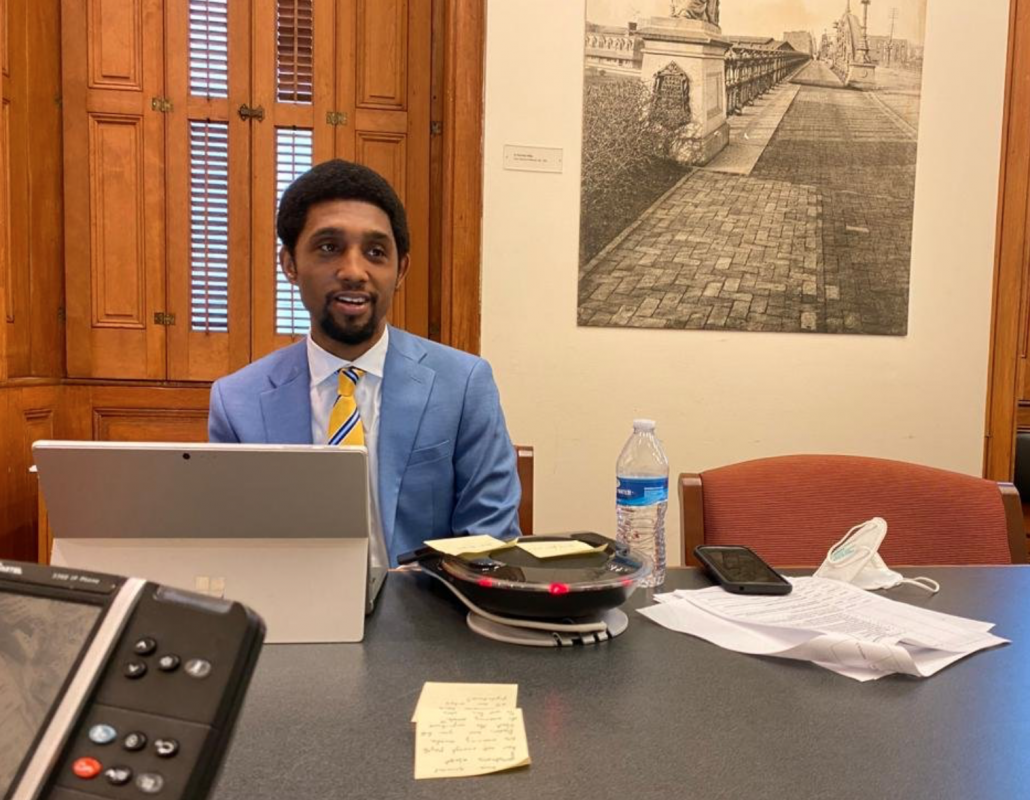
After the initial round of ballot tallying last week, 36-year-old City Council President Brandon Scott rallied as mail-in votes were counted over the past several days—pulling out a close victory over former Mayor Sheila Dixon in the Democratic primary for mayor, according to results posted Tuesday night.
In a crowded field with 24 candidates receiving votes, Scott won 29.4 percent of the tally. Dixon claimed 27.7 percent of the ballots cast—a margin of 2,358 votes. The final count remains unofficial and is not expected to be certified before Friday. Roughly 2,000 ballots remain outstanding.
Dixon, 66, also a former city council president, became Baltimore’s first female mayor in 2007 after Martin O’Malley was sworn in as governor. She resigned as part of a plea deal after being charged with multiple felonies and misdemeanors, including theft, perjury, and misconduct in office.
Scott will face Republican Shannon Wright, a nonprofit executive, in this fall’s general election. With a nearly 10-1 Democratic to Republican Party registration advantage in the city, Scott’s victory is all but assured in November.
“Tonight, we celebrate a hard-fought victory for the future of Baltimore,” Scott said in a statement. “From the bottom of my heart, I want to thank my family, my team, our volunteers, those who voted for a new way forward for Baltimore, and everyone who believes change is not just possible, but long overdue. Our city stands at a crossroads. Baltimore will only move forward as a city united, not divided. It will take all of us to build a city that is safe, equitable, and accountable. As a son of Baltimore, I could not be more honored to lead our great city in this critical moment and carry the work forward with you.”
Here are five things to know about Scott:
The City Council Elected Him as President Following Catherine Pugh’s Resignation
The city council elected Scott its president after Bernard C. “Jack” Young ascended to the mayor’s office following former Mayor Catherine Pugh’s resignation in the wake of the Healthy Holly children’s book scandal. Scott prevailed after a weekend-long, behind-closed-doors fight with Young’s chosen successor—Council Vice President Sharon Green Middleton. Initially, it appeared that neither Scott nor Middleton had the votes to prevail, but when the scales tipped in Scott’s favor, council members ultimately supported him 14-0.
He Was One of the Youngest Candidates Elected to Citywide Office
A subject in 2018’s well-received documentary Charm City, Scott was one of the youngest candidates ever elected to citywide office at 27. After growing up in Park Heights, he graduated from Mergenthaler Vocational-Technical High School, where he ran track and cross country, and then studied political science at St. Mary’s College in Southern Maryland. He got his start in politics as a liaison in the office of then-City Council President Stephanie Rawlings-Blake, who later became mayor. Scott will be significantly younger than the age of the average U.S. mayor—which is 56, according to a recent study. But the ambitious Scott would be the same age as Martin O’Malley when O’Malley ran for mayor and with several more years of elected experience. He lives in the city’s Frankford Neighborhood.
He Has a Diverse Coalition of Support
In mid-May, a Baltimore Sun, WYPR, and the University of Baltimore poll showed Scott was the only major mayoral candidate with near equal support among both black (16 percent) and white (17 percent) voters. Scott, who also had a diverse coalition of support, led among voters younger than 35 and also younger than 50. His late voting surge in ballots arriving in the final days before the June 2 postmark deadline indicate that he continued to win support as he marched with protestors in the city following the death of George Floyd. “I can talk young, old; rich, poor; white, black; gay, straight; trap house, board room,” Scott told the Baltimore Fishbowl following that poll. “No one else can do that in this race. No one else has that flexibility in this race.”
He Supports Defunding the Police
Scott was widely viewed as the most progressive of the top-tier candidates in the race. He has pushed for reforms that would curtail some of the power of inherit in Baltimore’s strong mayor even as he ran for the office. As the chair of the Council’s Public Safety Committee from 2016 until he became city council president, Scott advocated a holistic approach to crime reduction and for Baltimore police department reform. He co-founded the anti-violence group 300 Men March and is close to Ceasefire co-founder Erricka Bridgeford. “Baltimore must re-allocate its budget away from the current dependence on the police department,” Scott tweeted this week. “We must diversify our investments into agencies that focus on proactively developing our young people and communities.”
He Passed Groundbreaking Legislation Advocating for Racial Equity
Scott previously served as a member of the Budget and Appropriations and Judiciary and Legislative Investigations committees. In 2018, he introduced and passed groundbreaking legislation that created an equity assessment program in Baltimore that requires all city agency decisions—and their operating budgets, capital budgets, and proposed legislation—to be weighed through an equity lens.
Baltimore must re-allocate its budget away from the current dependence on the police department. We must diversify our investments into agencies that focus on proactively developing our young people and communities.https://t.co/aDDa7ySCF1 — Brandon M. Scott (@CouncilPresBMS) June 9, 2020
